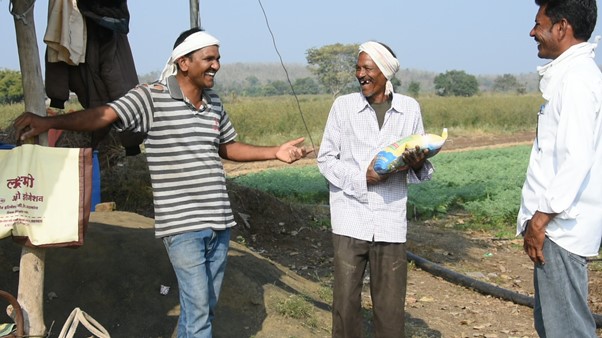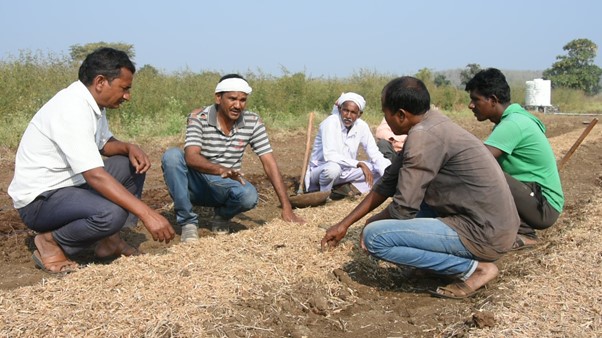by Tulsidas, with writing support from Ajitson Justus, Donor Liaison for World Vision India, and Jennifer Porter, Program Officer for Vista Hermosa Foundation

Tulsidas and his family farm 10 acres of land in Vidarbha, an area within Maharashtra state in central India. In Tulsidas’ community, debt and suicides were common as farmers were dependent on rainfall and predatory moneylenders to grow cotton as a cash crop.
People in Vidarbha do not use the term ‘mental health’ — farmers experience ‘tension’ before they take the extreme step of suicide. Tulsidas describes the cycle of economic violence and self-harm, where farmers turn to alcohol and tobacco to address this ‘tension’:
“Someone who is addicted spends a lot of money on these things and has hardly any savings. This person tends to neglect his home and there is no peace in the household. Relationships in the family are wounded. The addict loses sleep and health and is not able to work hard in the fields. Once health is lost, medical expenses balloon and there is further distress in the house. Debts begin to pile. The future of this family does not look very good. The next generation suffers from the same issues because this is all they know.”
When World Vision launched the Vidarbha Farmers’ Livelihood Project in 2007, it consisted of agricultural extension and financial literacy programs. While critical, these programs did not address the deeper needs of farmers and their communities — the destructive mindsets underlying hopelessness. Farmers were disconnected from their own emotions, their families, and their neighbors.
In 2017, World Vision implemented Empowered Worldview in Vidarbha, an asset-based approach that empowers communities to find value in themselves and create a positive vision for their future. Tulsidas remembers the words of Manohar, the former manager of the project, that broke through to him:
“You are a master and not a servant. You own your own land. It is time you lived like a master. The way I saw life changed. What I wanted to do with my life changed. Work gets done a lot faster when you have better relationships. I used to talk to people only when I needed to. I never thought of these conversations as a way to build relationships.”
Tulsidas’ family now shares more to support one another, and makes decisions about farming together. Seeing the power of this transformation for himself, Tulsidas established a MenCare group in his community, where men can come together to talk about their ‘tensions’ — their successes and struggles, their identity as farmers, and their roles as fathers, husbands, and neighbors. “We sit together and we talk about everything. One of my neighbors, Thakrey, he used to drink and come home drunk.”
In the MenCare group, Thakrey and his neighbors discussed his past, his feelings in the present, and his vision for the future:
“[Thakrey] liked being with us in the MenCare group. He has improved his farming and does not migrate for work. We discuss how much money he was able to save and what he is able to do with that money. He gets a lot of respect now. He has better thoughts, like ‘I need to send my children to school.’ Now he does not fight with his family.”
Through MenCare groups, farmers like Tulsidas and Thakrey build new connections and support one another to see a more hopeful future, breaking the cycle of addiction and self-harm:
“They are in debt. Yes. But if they care about themselves and their families, they will not commit suicide or be addicted to substances. Our ancestors struggled with daily wage labour and they struggled with money, but we want our children to have a better future.”
Editor’s Note: Vista Hermosa Foundation has been the sole supporter for the Vidarbha Farmers Livelihood Project since it launched in 2007. As the project comes to a close after 15 years, we cherish the opportunity we have had to go beyond the grant, build an international community of practice, and to learn alongside World Vision India’s staff and the communities they serve.
When World Vision launched Empowered Worldview, initially developed in Tanzania as a biblically-based curriculum, Suzanne Broetje had the honor of participating with the World Vision India team as they debated its adaptation to a multi-faith context. Together we learned that the socio-emotional work really should have come first; with this foundation, economic development would have emerged more quickly.
We take great joy that no famers have committed suicide since the project started and that today there is more care and respect between men and women, and fathers and their children. We are deeply grateful to Ajit for his accompaniment and for his powerful voice in capturing the stories of farmers. May the inspiration and hope of the Vidarbha farmers permeate the work of the Broetje Family Trust as we think more deeply about farmer wellbeing closer to home.


